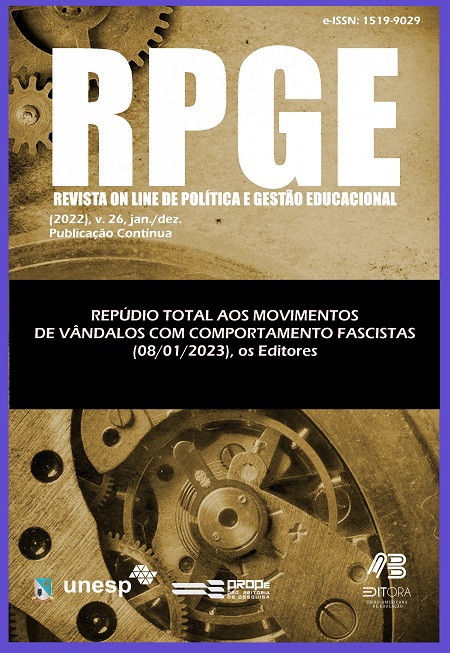Technologies in education and their transformations
A look from the concept of cultural capital
DOI:
https://doi.org/10.22633/rpge.v26i00.16061Keywords:
History, Technology, Education, Cultural capitalAbstract
This article aims to analyze aspects of the history of technologies inserted in education, aiming at educational development, under the light of Pierre Bourdieu's concept of “cultural capital”, considering part of the socio-historical process, changes and their uses in contemporary education that occurred in line with a new culture, since the school is not a neutral institution. We understand the socio-educational changes associated with a broader context. And the school is also transformed insofar as it includes in its curriculum and practices the use of communication and information technologies. We start from the problem related to the historical process of insertion of digital technologies in basic education and how can they lead to the development of the teaching and learning process? It will be a bibliographical research, taking into account the theoretical assumptions defended by: Bourdieu (2004); Saviani (1991); Kenski (2012) and Duarte (2008). The research showed that there were teachers who did not give the necessary attention, being reluctant to insert the TDIC in their classes. Others went in search of information and training so that they could teach classes in a virtual way, adding a new cultural capital to their practice.
Downloads
References
BOURDIEU, P. A economia das trocas simbólicas. Tradução: Sergio Miceli, Silvia de Almeida Prado, Sonia Miceli e Wilson Campos Vieira. São Paulo: Perspectiva, 2004.
BRASIL. Lei n. 9.394, de 20 de dezembro de 1996. Estabelece as diretrizes e bases da educação nacional. Brasília, DF: Presidência da República, 1996. Disponível em: https://www.planalto.gov.br/ccivil_03/leis/l9394.htm. Acesso em: 20 jan. 2021.
BRITO, G. S.; PURIFICAÇÃO, I. Educação e novas tecnologias: Um (re)pensar. Curitiba: InterSaberes, 2012.
DAVIS, N. Z. Culturas do povo: Sociedade e cultura no início da França moderna. 2. ed. Tradução: Marisa Corrêa. Rio de Janeiro: Paz e Terra, 1990.
DORIGONI, G. M. L.; SILVA, J. C. Mídia e educação: O uso das novas tecnologias no espaço escolar. Curitiba: Secretaria de Educação do Estado do Paraná, 2007. Disponível em: http://www.gestaoescolar.diaadia.pr.gov.br/arquivos/File/producoes_pde/artigo_gilza_maria_leite_dorigoni.pdf. Acesso em: 21 set. 2021.
DUARTE, N. Sociedade do conhecimento ou sociedade das ilusões? Quatro ensaios crítico-dialéticos em filosofia da educação. Campinas, SP: Autores Associados, 2008.
FERRARI, R. Internet. In: MILL, D. (org.). Dicionário crítico de educação e tecnologias e de educação à distância. Campinas, SP: Papirus, 2018.
KENSKI, V. M. Educação e tecnologias: O novo ritmo da informação. Campinas, SP: Papirus, 2012.
KUHN, T. S. A estrutura das revoluções científicas. São Paulo: Editora Perspectiva, 1998.
LÉVY, P. As tecnologias da inteligência: O futuro do pensamento na era da informática. Tradução: Carlos Irineu da Costa. Rio de Janeiro: Editora 34, 1993.
MORAN, J. M. Ensino e aprendizagem inovadores com tecnologias audiovisuais e telemáticas. In: MORAN, J. M.; MASETTO, M. T.; BEHRENS, M. A. Novas tecnologias e mediação pedagógica. Campinas, SP: Papirus, 2003.
PIES, N. G. Capital cultural e educação em Bourdieu. 2011. Dissertação (Mestrado em Educação) – Universidade de Passo Fundo, Passo Fundo, 2011. Disponível em: http://tede.upf.br/jspui/handle/tede/706. Acesso em: 11 abr. 2022.
PINTO, A. V. O conceito de tecnologia. Rio de Janeiro: Contraponto, 2005.
PINTO, M. M. Tecnologia e inovação. 2. ed. Florianópolis: Departamento de Ciências da Administração (UFSC), 2014.
SANCHO-GIL, J. M. Tecnologia Educacional. In: MILL, D. (org.). Dicionário crítico de educação e tecnologias e de educação à distância. Campinas, SP: Papirus, 2018.
SANTINELLO, J. Tecnologias da informação e comunicação (TIC) aplicadas à formação do gestor escolar. Guarapuava, PR: UNICENTRO, 2013.
SAVIANI, D. Pedagogia histórico-crítica: Primeiras aproximações. 2. ed. São Paulo: Cortez; Autores Associados, 1991.
SOARES, L. V.; COLARES, M. L. I. S. Educação e tecnologias em tempos de pandemia no Brasil. Revista Debates em Educação, Maceió; v. 12, n. 28, set./dez. 2020. Disponível em: https://www.seer.ufal.br/index.php/debateseducacao/article/view/10157/pdf. Acesso em 18 set. 2022.
TAJRA, S. F. Informática na educação. 5. ed. São Paulo: Editora Érica Ltda, 2012.
Published
How to Cite
Issue
Section
License
Copyright (c) 2022 Revista on line de Política e Gestão Educacional

This work is licensed under a Creative Commons Attribution-NonCommercial-ShareAlike 4.0 International License.
Manuscritos aceitos e publicados são de propriedade da Revista on line de Política e Gestão Educacional. É vedada a submissão integral ou parcial do manuscrito a qualquer outro periódico. A responsabilidade do conteúdo dos artigos é exclusiva dos autores. É vedada a tradução para outro idioma sem a autorização escrita do Editor ouvida a Comissão Editorial Científica.










